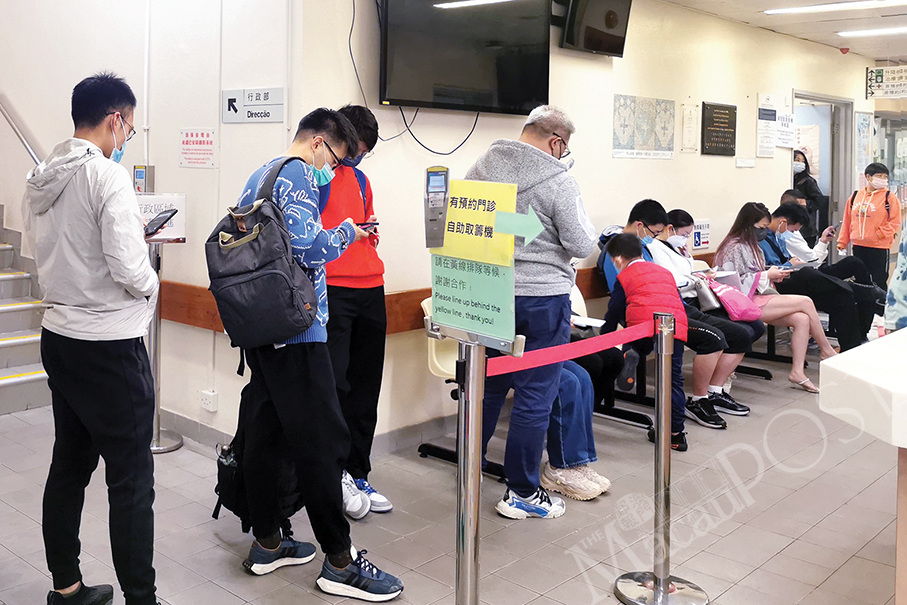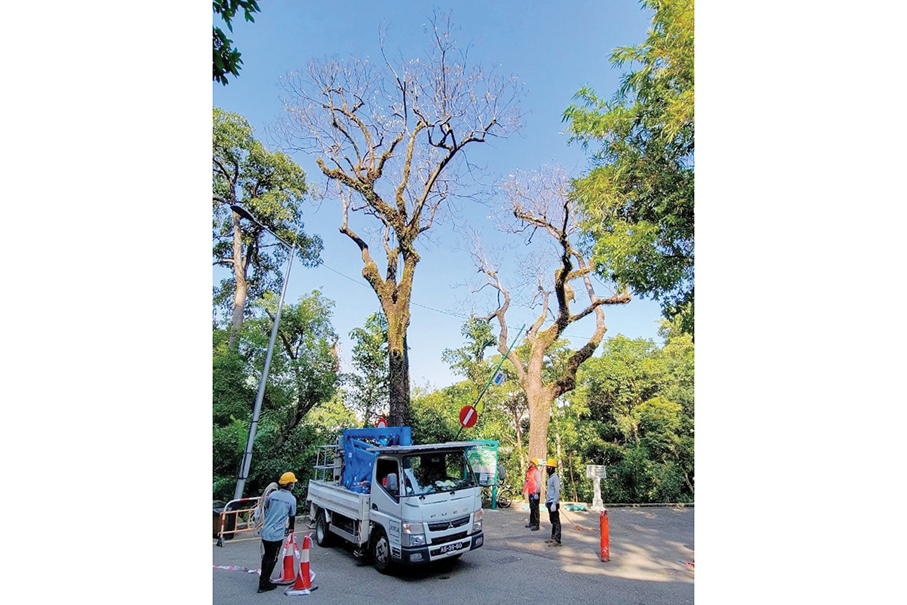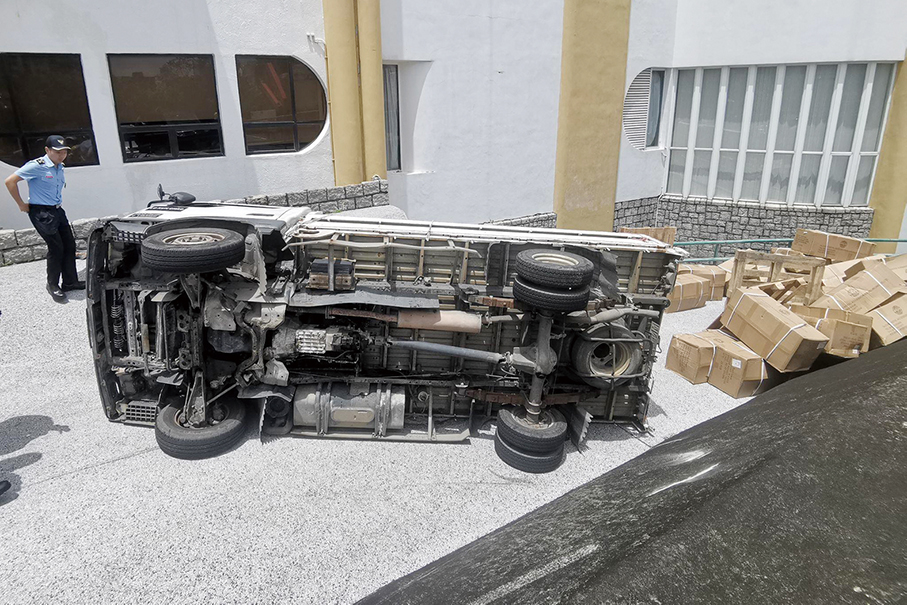Home isolation for infectees from Wednesday
The Macau government has started the gradual easing of COVID-19 restrictions, thereby implicitly allowing constant transmissions of the novel coronavirus in the community, with a string of special measures aiming to limit the pace of the COVID-19 spread with the objective of preventing a massive outbreak.
However, the government has also warned that with the new anti-COVID-19 landscape in place, between 50 and 80 percent of the population are eventually expected to contract the novel coronavirus.
For instance, COVID-19 close contacts are now allowed to quarantine at home instead of at a government-designated facility, and from Wednesday asymptomatic COVID-19 carriers or those with slight symptoms will be be able to undergo isolation at home. Only those who have been assessed as needing medical treatment will be transferred to hospital or quarantine facilities.
Nevertheless, the Macau government says it estimates that at least 90 percent of COVID-19 carriers can undergo isolation at home.
The Macau Health Bureau (SSM) has underlined that it is aiming for the upcoming “infection curve to go up more gently” with the aim of preventing the city’s health system from collapsing.
In addition, from today members of the public are no longer required to scan venue codes with their Macau Health Code mobile app when entering public venues and facilities. However, those entering four types of public venues, namely government offices, health facilities, social service facilities (including day nurseries) and schools are still required to generate and present their Macau Health Code.
Secretary for Social Affairs and Culture Elsie Ao Ieong U, whose portfolio includes the public health sector, announced the step-by-step easing of COVID-19 curbs during a special press conference on Thursday which was also attended by senior officials of the Health Bureau such as its director Alvis Lo Iek Long. Thursday’s press conference came after the central government announced on Wednesday 10 additional major measures to further relax COVID-19 curbs in the mainland.
In addition, the Macau government convened one more press conference on Saturday where Lo and other Health Bureau officials announced further and follow-up details of the gradual relaxation of COVID-19 restrictions.
Macau has ‘conditions’ for easing COVID-19 curbs
During Thursday’s press conference, Ao Ieong noted that Macau’s cumulative number of COVID-19 cases has been low over the past three years of fighting the novel coronavirus, with only six deaths. She went on to say that while the Omicron variant is very contagious compared to the original COVID-19 strain, those infected with Omicron will normally have their symptoms subside “relatively easily”. Combined with Macau’s COVID-19 vaccination rate among the population exceeding 90 percent, she said, Macau now has the “conditions” for gradually easing its COVID-19 measures.
Ao Ieong underlined that in compliance with the central government’s announcement of its 20 major measures for relaxing COVID-19 curbs in the mainland and with its 10 additional easing measures announced on Wednesday, the Macau government has now drawn up a contingency plan that aims to enable the city to tackle the new anti-COVID-19 landscape in an “orderly” manner.
The policy secretary said that the local government has been preparing the contingency plan for two months in case of the central government’s decision to ease COVID-19 restrictions, adding that the local government will generally follow the central government’s latest anti-COVID-19 guidelines but will adapt them to the local situation.
Ao Ieong said that while the local government will ensure that the city’s health system can tackle the new situation of constantly having new COVID-19 infections in the community, it estimates that between 50 and 80 percent of the population are eventually expected to be infected with the novel coronavirus.
Step-by-step approach
Ao Ieong underlined that the local government will “transition” the city from a zero-COVID approach to the new anti-COVID-19 situation with the “orderly” implementation of adjusted measures with the aim of preventing a COVID-19 outbreak from occurring “exponentially”. The government will pursue a step-by-step approach towards easing COVID-19 restrictions in order to minimise severe cases and even fatalities as much as it can with the aim of avoiding the city’s health system being overwhelmed, she said.
Ao Ieong noted that the Omicron variant has become prevalent across the world, adding that while the latest data of scientific research have indicated that over 50 percent of those infected with Omicron are normally asymptomatic, the remainder will usually come down with different levels of symptoms. Consequently, she said, a step-by-step approach was needed in order to avoid a large number of infections within a short period of time.
The policy secretary said that the local government has decided roll out a string of measures aiming to help the population go through a COVID-19 “transition” period, such as providing free anti-COVID-19 kits to residents and various groups of non-locals living in Macau, and boosting COVID-19 vaccinations among senior citizens.
Ao Ieong also said that self-tests with rapid antigen test (RAT) kits will gradually replace nucleic acid tests (NATs).
Despite the local government’s decision to gradually relax its COVID-19 curbs, Ao Ieong underlined that Macau must continue to implement COVID-19 entry measures in compliance with the mainland. Nevertheless, she added that as long as Macau can “smoothly” go through its COVID-19 transition period in the near future, the local government’s mandatory hotel quarantine for arrivals from the Chinese regions of Hong Kong and Taiwan as well as foreign countries would be “adjusted soon”.
Health chief urges public not to panic
During Thursday’s press conference, Lo urged residents “not to panic” over the new COVID-19 landscape of having a rising number of COVID-19 community cases following the government’s decision to ease its COVID-19 restrictions, calling everyone to deal with the new situation with a “calm” attitude.
Lo also said that according to experiences and data worldwide, the local government estimates that at least 90 percent of COVID-19 carriers could undergo isolation at home after their conditions have been medically assessed, while less than 10 percent of them would need medical treatment because of which they would be transferred to the public Conde de São Januário Hospital Centre, the Public Health Clinical Centre in Coloane, or government-arranged hotels used for isolation treatment.
Lo said that for tackling the upcoming COVID-19 situation, the government has prepared 600 beds at the public hospital, the Public Health Clinical Centre, and the community treatment centre at the Macau East Asian Games Dome in Cotai, while over 6,000 beds have been arranged in isolation hotels.
Lo underlined that the government will ensure that the upcoming “infection curve” would only rise gently, adding that the government will try its best to maximise the length of time before half of the population have cumulatively been infected with COVID-19.
Since Friday last week, arrivals from the mainland have no longer been required to undergo any nucleic acid tests and rapid antigen tests upon arrival in Macau and during their stay here, meaning that while those arriving from Zhuhai are currently only required to present a 24-hour NAT result when entering Macau, those arriving from all other areas in the mainland are required to display a 48-hour NAT result when boarding a plane, or a ferry from Shenzhen.
Also starting from Friday last week, those who have completed their five-day hotel quarantine in Macau after arriving from Hong Kong, Taiwan, foreign countries, or high-risk COVID-19 areas in the mainland will no longer have a red Macau Health Code for three days, instead their health code will merely indicate yellow during the three-day period, which allows them to move around the city more freely.
Home isolation for COVID-19 carriers after e-platform assessments
During Saturday’s follow-up press conference, Lo announced that Macau will enter its “second phase” of relaxed COVID-19 restrictions on Wednesday this week when those who have tested positive for the novel coronavirus in a nucleic acid test or a rapid antigen test may be able to undergo isolation at home, depending on the outcome of a self-health assessment to be submitted to the Health Bureau via an e-platform.
According to Lo, the results will be indicated by a four-colour system: “green” means that the infected person will be able to quarantine at home; “yellow” requires the infectee to book an appointment at a designated community clinic for follow-up assessment; “orange” requires the infectee to seek assessment at the community treatment centre at the East Asian Games Dome; “red” means that the infected person will be transferred by ambulance to the public Conde de São Januário Hospital Centre for treatment. About 20 community clinics will be operational from Wednesday.
Lo said that only those who have been assessed by doctors at community clinics or the community treatment centre as needing medical treatment will be transferred to hospital or quarantine facilities, while others will be able to undergo isolation at home.
Lo also said on Saturday that the government had begun to hand out free anti-COVID-19 kits to people in Macau, containing antipyretics, traditional Chinese medicine (TCM) supplements, RAT kits and KN95 facemasks. Local residents, non-resident workers, non-local students enrolled in Macau’s higher education institutions, and other non-locals holding a permit to stay in Macau are entitled to the kits.
Lo also said that those undergoing home isolation after having been diagnosed with COVID-19 will have their Macau Health Code turn red during a five-day isolation period, while those living with them will be classified as COVID-19 close contacts because of which their health code will turn yellow.
According to Lo, those with a yellow health code due to this reason can go to work, but they should refrain from visiting venues involving crowds.
Those undergoing home isolation with a red health code will be allowed to leave home for emergency matters as long as they implement strict self-protective measures.
On Saturday, 106 COVID-19 cases were reported in the community, according to the Health Bureau.

Residents queue to get vaccinated against COVID-19 at a health facility on Friday. – Photo: GCS






